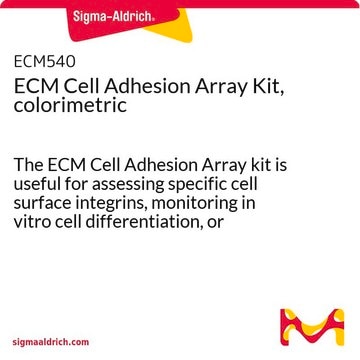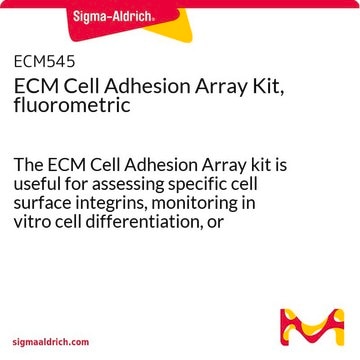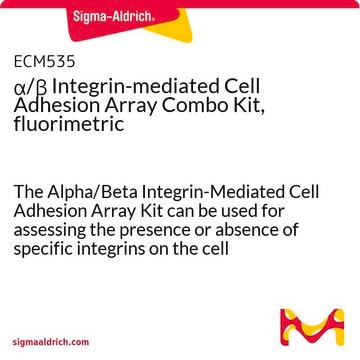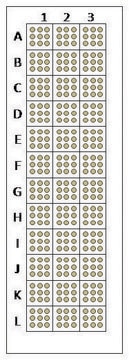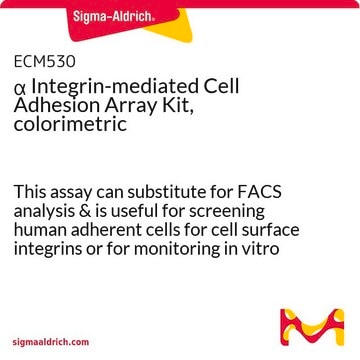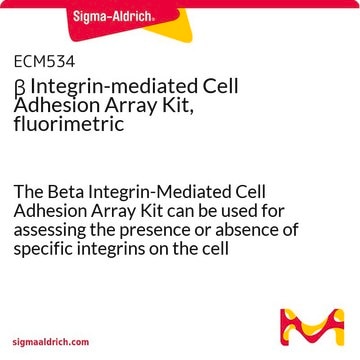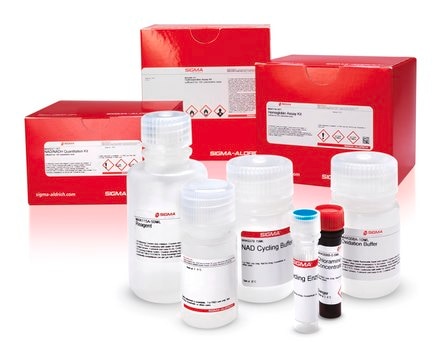ECM532
α/β Integrin-mediated Cell Adhesion Array Combo Kit, colorimetic
The Alpha/Beta Integrin-Mediated Cell Adhesion Array Kit can be used for assessing the presence or absence of specific integrins on the cell surface.
Synonym(s):
α/β integrin probe, cell surface integrin detection kit
Sign Into View Organizational & Contract Pricing
All Photos(1)
About This Item
UNSPSC Code:
12352207
eCl@ss:
32161000
NACRES:
NA.32
Recommended Products
Quality Level
species reactivity
human
manufacturer/tradename
Chemicon®
technique(s)
cell based assay: suitable
NCBI accession no.
detection method
colorimetric
shipped in
wet ice
Gene Information
human ... ITGA1(3672)
Application
Research Category
Cell Structure
Cell Structure
The Alpha/Beta Integrin-Mediated Cell Adhesion Array Kit can be used for assessing the presence or absence of specific integrins on the cell surface.
The CHEMICON® Alpha/Beta Integrin-Mediated Cell Adhesion Array Kit can be used for assessing the presence or absence of specific integrins on the cell surface. This assay can substitute for FACS analysis (3) and is useful for screening human adherent cells for cell surface integrins or for monitoring in vitro cell differentiation or genetic modification of cells.
For Research Use Only. Not for use in diagnostic procedures.
For Research Use Only. Not for use in diagnostic procedures.
Packaging
96 wells
Components
Alpha Integrin Array Plate: (PN: 90599) One 96-well plate with 12 strips. Each strip contains one well each of the mouse anti-alpha integrin monoclonal antibodies: (alpha1, alpha2, alpha3, alpha4, alpha5, alphaV, alphavbeta3), and one goat anti-mouse negative well. See the plate layout on product insert.
Beta Integrin Array Plate: (PN: 90600) One 96-well plate with 12 strips. Each strip contains one well each of the mouse anti-beta integrin monoclonal antibodies: (beta1, beta2, beta3, beta4, beta6, alphaVbeta5, and alpha5beta1), and one goat anti-mouse negative well. See the plate layout on product insert.
Cell Stain Solution: (Part No. 90144) Two 20 mL bottles.
Extraction Buffer: (Part No. 90145) Two 20 mL bottles.
Assay Buffer: (Part No. 90601) Two 100 mL bottles.
Beta Integrin Array Plate: (PN: 90600) One 96-well plate with 12 strips. Each strip contains one well each of the mouse anti-beta integrin monoclonal antibodies: (beta1, beta2, beta3, beta4, beta6, alphaVbeta5, and alpha5beta1), and one goat anti-mouse negative well. See the plate layout on product insert.
Cell Stain Solution: (Part No. 90144) Two 20 mL bottles.
Extraction Buffer: (Part No. 90145) Two 20 mL bottles.
Assay Buffer: (Part No. 90601) Two 100 mL bottles.
Storage and Stability
The experimental and control plates can be stored at 2° to 8°C in the foil pouch up to their expiration. Unused strips may be placed back in the pouch for storage. Ensure that the desiccant remains in the pouch, and that the pouch is securely closed.
Precautions
· Cell stain contains minor amounts of crystal violet, a toxic substance, which may cause cancer and heritable genetic damage. Handle with caution. Toxic by inhalation and if swallowed. Irritating to eyes, respiratory system and skin.
· Extraction buffer contains alcohol. Avoid internal consumption.
Precautions
· Cell stain contains minor amounts of crystal violet, a toxic substance, which may cause cancer and heritable genetic damage. Handle with caution. Toxic by inhalation and if swallowed. Irritating to eyes, respiratory system and skin.
· Extraction buffer contains alcohol. Avoid internal consumption.
Legal Information
CHEMICON is a registered trademark of Merck KGaA, Darmstadt, Germany
Disclaimer
Unless otherwise stated in our catalog or other company documentation accompanying the product(s), our products are intended for research use only and are not to be used for any other purpose, which includes but is not limited to, unauthorized commercial uses, in vitro diagnostic uses, ex vivo or in vivo therapeutic uses or any type of consumption or application to humans or animals.
signalword
Danger
hcodes
Hazard Classifications
Eye Irrit. 2 - Flam. Liq. 2
wgk_germany
WGK 1
Certificates of Analysis (COA)
Search for Certificates of Analysis (COA) by entering the products Lot/Batch Number. Lot and Batch Numbers can be found on a product’s label following the words ‘Lot’ or ‘Batch’.
Already Own This Product?
Find documentation for the products that you have recently purchased in the Document Library.
S Almqvist et al.
Journal of wound care, 20(2), 68-68 (2011-03-08)
To study the effects of an amelogenin mixture on integrin-dependent adhesion, DNA synthesis and apoptosis of cultured human dermal microvascular endothelial cells and angiogenesis in an organotypic assay. Immobilised antibodies against specific integrins (alpha-1, alpha-2, alpha-3, alpha-4, alpha-5, alpha-v, ß1
Chelsea J Stoikos et al.
Human reproduction (Oxford, England), 25(7), 1767-1774 (2010-05-12)
During implantation, the embryo adheres to the endometrium via cell adhesion molecules (CAMs) present on blastocyst trophectoderm and endometrial epithelial cells. CAMs, including integrins and extracellular matrix (ECM) ligands, are most likely regulated by hormones, cytokines and growth factors. We
Nathaniel J Hogrebe et al.
Nature biotechnology, 38(4), 460-470 (2020-02-26)
Generation of pancreatic β cells from human pluripotent stem cells (hPSCs) holds promise as a cell replacement therapy for diabetes. In this study, we establish a link between the state of the actin cytoskeleton and the expression of pancreatic transcription
Our team of scientists has experience in all areas of research including Life Science, Material Science, Chemical Synthesis, Chromatography, Analytical and many others.
Contact Technical Service